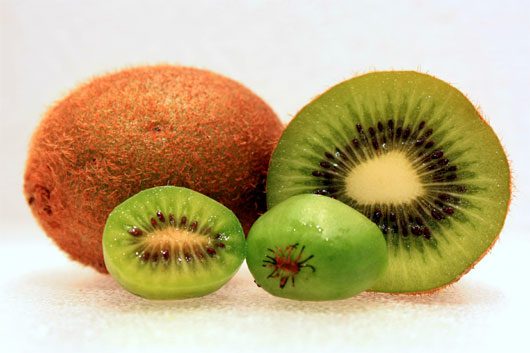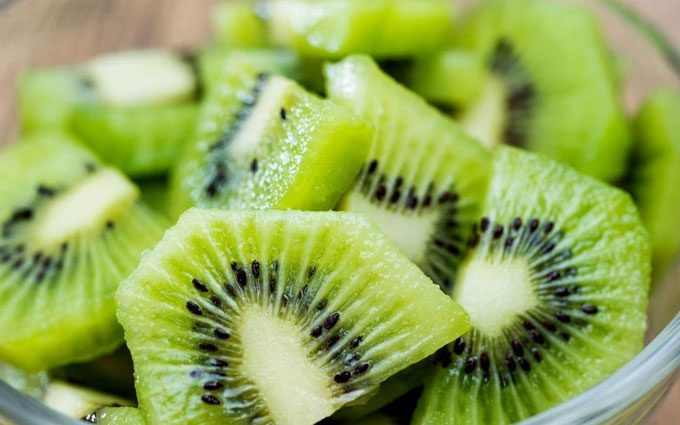The reasons below will help you understand why we should eat kiwi, a highly popular fruit. A study shows that the combination of antioxidants in kiwi helps protect DNA from oxidative processes. Additionally, kiwi has the ability to prevent cancer.
Benefits of Eating Kiwi
- Kiwi contains enzymes beneficial for digestion
- Helps regulate blood pressure
- Protects DNA
- Boosts the immune system
- Aids in weight loss
- Improves digestion
- Helps detoxify the body
- Fights against heart disease
- Suitable for diabetic patients
- May prevent macular degeneration
- Creates alkaline balance
- Excellent nutrition for the skin
- Rich nutritional source
- A natural organic source
- Rich in antioxidants
- Provides energy, prevents osteoporosis
Kiwi is a fruit native to New Zealand, characterized by its soft, fuzzy brown exterior, resembling the sapodilla fruit in Vietnam. Inside, the fruit contains black seeds surrounding a white core, with vibrant green or golden flesh, a fragrant aroma, and a sweet, mildly tart flavor when fully ripe. Kiwi is not yet cultivated in Vietnam and is usually sold through imports, making it relatively expensive.

Kiwi is a fruit native to New Zealand.
Kiwi is considered a “small but mighty” fruit because it contains vitamins C and E, along with minerals such as calcium, chromium, copper, iron, zinc, magnesium, and compounds like polyphenols and folic acid. Therefore, make sure to include this fruit in your diet.
Kiwi Contains Enzymes Beneficial for Digestion
Kiwi contains actinidin, an enzyme capable of breaking down proteins and improving digestion (similar to bromelain in pineapple or papain in papaya).
Helps Regulate Blood Pressure
Kiwi has a high potassium content, which helps balance electrons in the body by neutralizing sodium levels.
Protects DNA
Research has demonstrated that the combination of antioxidants in kiwi helps protect DNA from oxidative damage. Furthermore, kiwi has cancer-preventive properties.

Kiwi is very beneficial for the body. (Image: Wikipedia)
Boosts the Immune System
The high vitamin C content and antioxidants in kiwi have been shown to enhance the immune system.
Aids in Weight Loss
With a low glycemic index and high fiber content, kiwi does not cause a sudden spike in insulin levels like many high-glucose fruits. Thus, eating kiwi in moderation will not lead to obesity. Moreover, those on a weight loss diet should consider adding this fruit to their meals.
Improves Digestion
Kiwi is an excellent source of fiber, which can prevent constipation and diarrhea, as well as other intestinal issues.
Helps Detoxify the Body
The fiber content in kiwi effectively helps detoxify the intestinal system.
Fights Against Heart Disease
Eating 2/3 of a kiwi each day can reduce the risk of blood clotting by 19% and decrease fat levels by 16%. Many people use aspirin to reduce blood clotting, but this medication can have serious side effects, such as inflammation and gastrointestinal bleeding. Kiwi contains natural anticoagulants with no adverse effects, benefiting health instead.
Suitable for Diabetic Patients
With a low glycemic content, kiwi does not cause a sudden increase in blood sugar levels. The glycemic index of this fruit is consistently safe for diabetics.
May Prevent Macular Degeneration
Macular degeneration is a leading cause of vision loss in older adults. A study indicates that consuming 3 kiwis daily (or more) can reduce the risk of macular degeneration by up to 35%. The high levels of lutein and zeaxanthin in kiwi are also natural compounds found in the human eye.

Kiwi tops the list of alkaline fruits. (Image: giamcan24h.edu.vn).
Creates Alkaline Balance
Kiwi is at the top of the list of alkaline fruits. This means it contains a rich amount of minerals to replace overly acidic foods.
Excellent Nutrition for the Skin
The vitamin E found in kiwi is known for its antioxidant properties, protecting the skin from degradation.
Rich Nutritional Source
Kiwi is visually appealing and delicious, making it a favorite among children due to its unique appearance. With a balanced nutrient profile, kiwi is genuinely beneficial for people of all ages and dietary preferences.
A Natural Organic Source
Kiwi is on the list of foods safe from many pesticides. In 2011, it was ranked among the top 10 safest foods in the world.
Rich in Antioxidants
Not only is kiwi rich in vitamin C, but it also contains a significant amount of vitamin E, fiber, potassium, and folic acid. These substances are powerful antioxidants that help fight certain cancer diseases that destroy cells while also promoting robust health.
Provides Energy, Prevents Osteoporosis
In 100g of kiwi flesh, there is about 17mg of magnesium. Magnesium is essential for the nervous system and muscle function, and it also helps boost energy levels.
With potassium levels approximately 20% higher than bananas, eating kiwi is an excellent way to supply this essential mineral, aiding in blood pressure control and reducing the risk of kidney stones, osteoporosis, and strokes.




















































